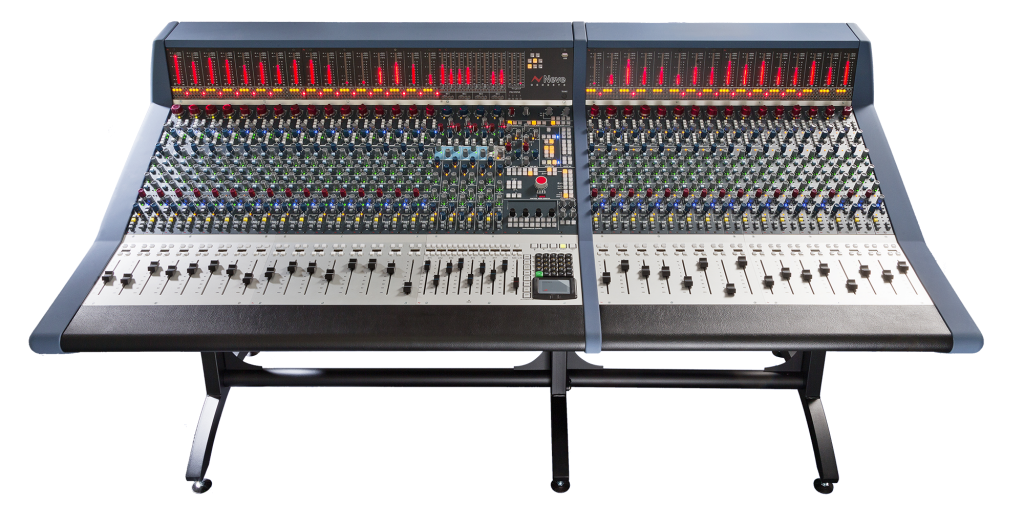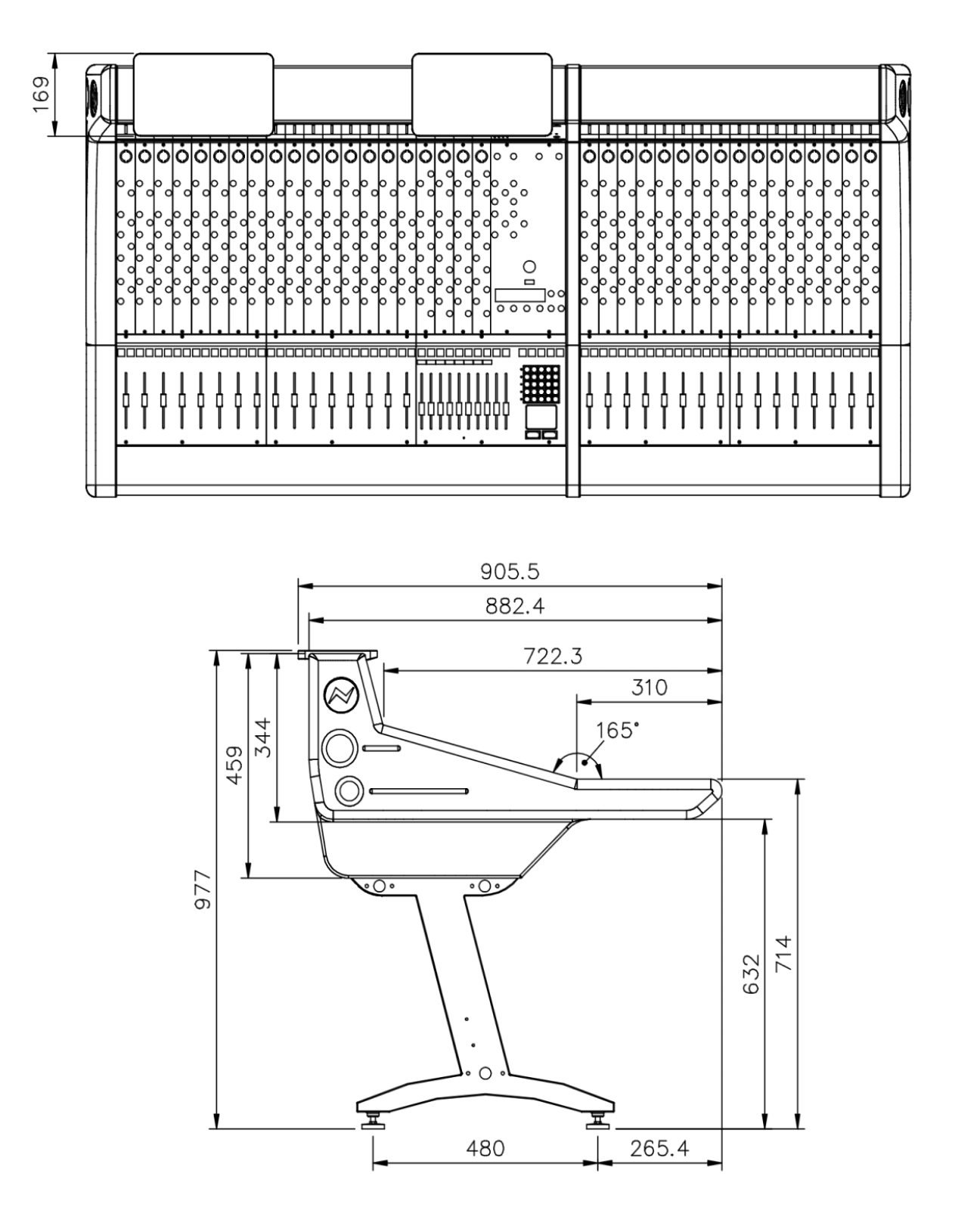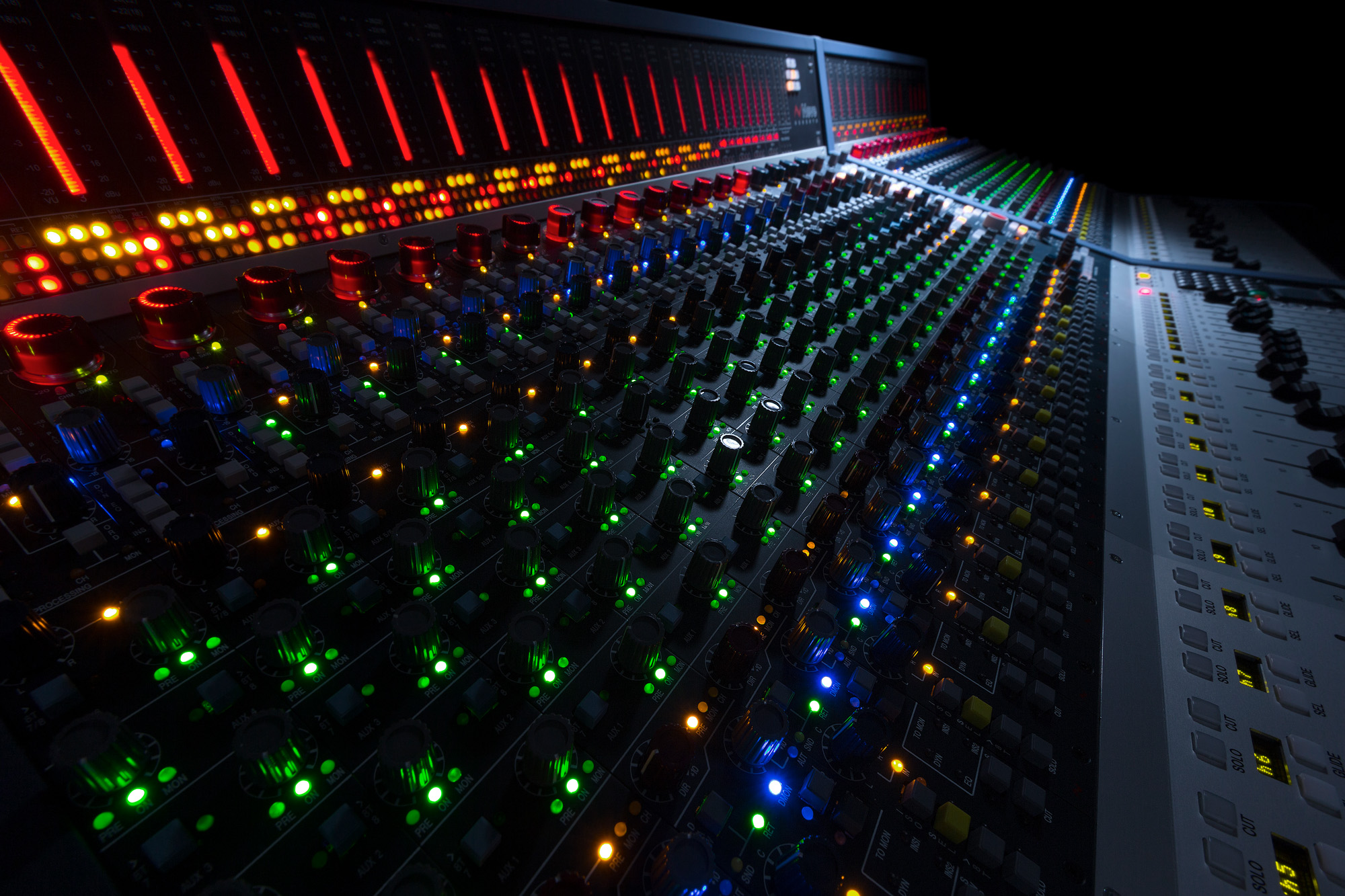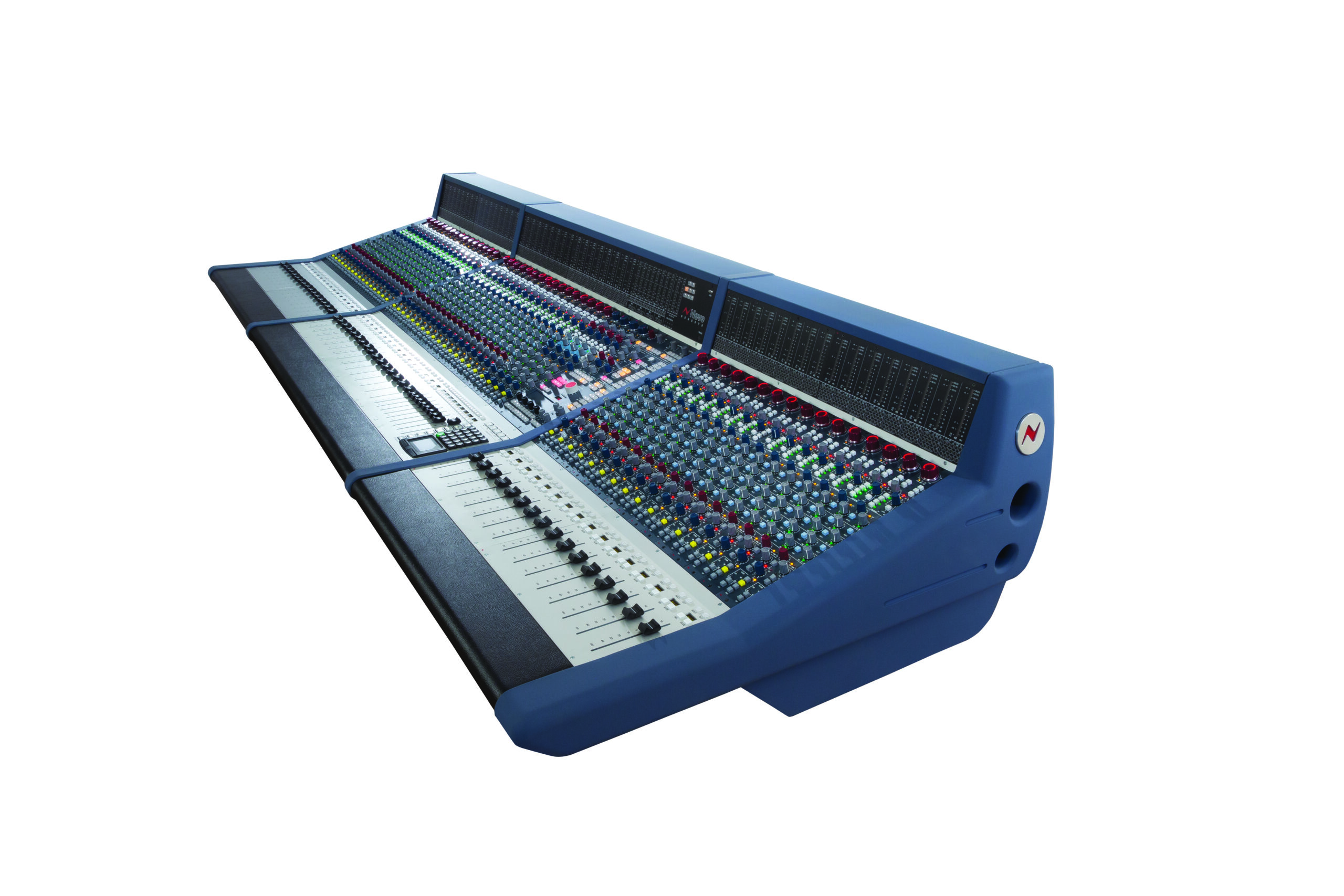Overview
Genesys
Digital Control, Analogue Flow, Neve® Sound.
Neve Engineers created the Genesys from the ground up as the ideal creative mixing tool for recording and mixing music today. With the Genesys, add the DAW of your choice and your microphones, monitors and music, and you’ve got a fully-fledged, world-class Neve studio at your command.


180° – Click & Drag
Legendary Analogue Sound
1073 Preamps
Each analogue channel strip features digitally-controlled 1073® preamps with exclusive Marinair® transformers.
88R 4-Band/1084 3 Band EQ
Two EQ’s for modern or vintage Neve® flavour – Genesys consoles are the only studio consoles to feature digitally controlled, pure analogue EQ processing.
VCA Compressor/Gate/Expander
The VCA dynamics card, evolved from the 88RS console channel dynamics provides a digitally controlled Compressor/Gate/Expander for every channel strip.
Plugin-Style Signal Flow
Customise your analogue signal flow with the drag-and-drop processing order feature. Reorder real analogue processing as if it was a software plugin – EQ, Dynamics, and dual Inserts.
Huge Routing Capabilities
Eight aux sends and eight group busses with soft switching & digital routing matrix control speed up studio workflow, automatically handling all routing for every session.
Modern In-line Architecture
The dual input in-line channel strip doubles the channel count when mixing large sessions, with motorised faders providing total dual-layer control of all signal paths.
Neve Flagship Monitoring
88R - Evolved
With a bandwidth that surpasses high sample rate digital audio quality, the Genesys’ high headroom mix bus, derived from the 88R console, is enhanced with powerful digital control elements.
Supreme Monitoring
Two stereo and two surround loudspeaker outputs, mirrored with stereo and surround external inputs, deliver unparalleled monitoring options for any studio.
Professional Metering
The consoles PPM/VU scale 48-segment LED meters use 88R ballistics to deliver total accuracy for channel, groups, and mix signals.
Stereo & Surround Mixing
With a digital routing matrix, LCR panning system, 20 bussing paths and multiple outputs, the Genesys can mix in stereo, and 5.1 surround simultaneously.
Stem Mixing
Eight mono groups, each with insert, routing, bussing and analogue/digital direct output, are perfect for stem mixing, and the 2T bus is ideal for creating dual-stereo mixes from the same console pass.
FX/Cue Mix Connectivity
Four digitally-controlled stereo reverb returns are ideal for easily connecting multiple external FX units, and two dedicated cue mixers are perfect for meeting performer demands.
Standalone & DAW Automation
Total Recall Software
Every Setting on the Genesys can be recalled in a matter of minutes. The 1073’s, EQ, Dynamics, soft switches, and routing and motorized faders are automatically recalled at the push of a button.
Encore Automation
The Genesys console utilises Neve’s standalone flying fader automation system, based upon the automation system from the groundbreaking 88R Console.
Multi-Layer Control
MDAC Technology assigns the faders to control multiple layers of the console audio. Faders can flip to control channel levels or monitor levels when mixing larger sessions.
Total DAW Control
In DAW mode, the console faders control the DAW of your choice, including cuts, solos, transport and automation controls – total control at the push of a button.
Plug & Play Audio Interface
Genesys’ AD/DA cards handle all conversion internally, connecting via multi-mode MADI optical. With this option installed, all signal paths flow into a single USB cable, allowing ultimate plug-and-play for visiting engineer’s laptops.
Mastering-Grade Conversion
The optional MADI AD/DA converter cards for the Genesys have been pitted against the best names in the business and stood out for their clarity, quality and musicality.
Unique Hybrid Workflow
Plugin/Console Integration
Control and automate the console from the DAW with the one-of-a-kind automation plugin. Harness the power and speed of in-the-box workflow while reaping all the benefits of the Neve® analogue console sound.
Channel Strip Automation
Channel strip soft switches can be controlled from within the DAW; aux sends, processing activation, and hardware insert activation can now be automated from the linear DAW timeline.
EQ & Dynamics Automation
The consoles 1084 or 88R EQ and complete dynamics section controls appear within a fully interactive GUI plugin window, allowing for ultimate control, automatic recall, and automation from your DAW of choice.
Stereo Linking & Channel Naming
Channels can be stereo linked at the push of a button, including channel EQ, dynamics, soft switches and faders. The console scribble strips can be edited from within the DAW plugin, perfectly matching console settings to the DAW session.
Dual-Layer Automation
The GenesysControl plugin enables a powerful feature – automation of the small fader or monitor return. With the plugin installed, the console dual-channel count is enhanced with total control & automation of all mix signals.
Mastering-Section Controls
Not only can every channel strip be controlled and automated from within the DAW, but the GenesysControl Plugin Master GUI also enables complete control of the 8T Group channels, fader, stereo master fader, stereo mix inserts and reverb return levels.
Genesys G3D
Dolby Approved System
Our Engineers have worked closely with the team at Dolby to devise and approve a unique and intuitive control system, allowing Dolby Atmos mixing directly from the Genesys G3D console surface.
New Workflow Possibilities
By using a single piece of hardware, Genesys G3D users can track, overdub, mix in stereo AND mix in Dolby Atmos. This provides a “one-stop-shop” for all aspects of modern mixing.
Dolby Atmos Mixing
The new I/O mapping method allows the Genesys analogue channel strips (including EQ dynamics processing, outboard insert paths and analogue fader motions), to be utilised to mix analogue audio in three-dimensions. This is the first time this has been possible on a Neve analogue console!
Hardware & Software Enhancements
Our Neve Engineers have devised a unique combination of both hardware and software enhancements to the Genesys/Genesys Black Consoles, creating an intuitive platform for three-dimensional mixing.
Digital Control Framework
The Genesys/Genesys Black is the only studio console featuring soft switching and controls. This system allows for multiple internal and external uses, including the new Dolby Atmos Renderer control options.
Futureproof Your Console
The G3D system is available to purchase as a new made-to-order console.
From our Community
80 HERTZ Studios
Radar Sounds
Ben Baptie
An Expert Overview
Watch the video series below and get some pro tips from the experts using the console.
More Information and Support
General Specification
- Total Reset & Total Recall
- Motorised Analogue/DAW control faders
- Internal PSU
- USB stick store, load & reset
- Optional – Neve 88R-style, 4-band EQ
- Optional – 1084 Inductor-based EQ
- Optional – VCA Dynamics package
- Optional – MADI AD/DA Conversion package
- Heat Dissipation – 16 channel console < 500 watts, each 16 channel section < 350 watts
- Power Factor – >0.65
- Voltage – Input Voltage Range 90 – 250 volts AC only, auto-ranging
- Current – Standard 16 channel 2.5 to 4 Amps RMS, each 16 channel section 1.5 – 3.0 Amps RMS, Switch-on surge 10 amps for 7ms (average)
Channel Strip I/O
- Mic input (XLR)
- Line input (TRS)
- DAW input (D-Type)
- 2x tape return (D-Type)
- Direct output (D-Type)
Channel Processing
- Digitally-controlled 1073 mic preamplifiers
- Digitally-controlled 88R-Style 4-band EQ
- Digitally-controlled 1084 inductor based 3-band EQ
- Digitally-controlled VCA compressor/gate
- Dual analogue inserts
- Drag and drop signal processing interface
Channel Routing
- Four mono aux sends (pre/post fader & channel/monitor path)
- Two stereo aux sends (pre/post fader & channel/monitor path)
- Digital routing matrix
- In-line architecture (Double mixing channel count)
- L/R & LCR panning system for channel and monitor paths
- Motorized fader with MDAC multi-layer control
DAW Control Features
- Multi-DAW support (Pro Tools, Logic, Cubase, Nuendo)
- Transport control section
- DAW Automation controls
- DAW fader flip mode
- VPOT control for DAW plugins, pans & aux sends
- DAW fader channel & bank navigation
Encore Automation Package
- Standalone computer software running on Genesys internal computer
- Full automation control switches
- Editable mix tree with multiple mix revisions
- MTC connection for DAW/Tape machine communication
Remote Preamp Control
- Control up to 16 4081 remote preamps
- FNC remote from 1073 encoders
Metering & Monitoring
- Dual 5.1 loudspeaker outputs
- Dual Stereo loudspeaker outputs
- 48-segment LED metering for channel, DAW, 8T, 2T and monitoring
- PPM/VU scale metering
- 6 Auxes (4 mono and 2 stereo)
- 8 groups, 2 main outs
- 4 stereo effects returns
- 5.1 mixing & monitoring
- 2 dedicated cue mixes
- Full talkback/ return talkback capability
Audio Performance
Mic Input (Electronically Balanced) to Insert Send
- Headroom – >+27dBu @ 1kHz (<0.5% THD+N)
- Frequency Response – Typically +/- 0.05dB, 20Hz to 20kHz
- Distortion (THD+N) – Typically 0.002% @ 1kHz (measured at +20dBu 10Hz to 80kHz filter)
- Noise (EIN) – <-127.5dBu (20Hz to 22kHz filter, 60dB gain, input terminated 150Ω R)
Line Input to Insert Send
- Headroom – >+27dBu @ 1kHz (<0.5% THD+N)
- Frequency Response – Typically +/- 0.05dB, 20Hz to 20kHz
- Distortion (THD+N) – Typically 0.001% @ 1kHz (measured at +20dBu, 10Hz to 80kHz filter)
- Noise – <-92dBu (20Hz to 22kHz filter)
Line Input to Direct Output
- Headroom – >+27dBu @ 1kHz (<0.5% THD+N)
- Frequency Response – Typically +/- 0.1dB, 20Hz to 20kHz
- Distortion – (THD+N) Typically 0.001% @ 1kHz (measured at +20dBu, 10Hz to 80kHz filter)
- Noise – <-90dBu (20Hz to 22kHz filter)
DAW Return Input to Mix Output
- Headroom – >+27dBu @ 1kHz (<0.5% THD+N)
- Frequency Response – Typically +/- 0.1dB, 20Hz to 20kHz
- Distortion (THD+N) – Typically 0.001% @ 1kHz (measured at +20dBu, 10Hz to 80kHz filter)
- Noise – <-90dBu (20Hz to 20kHz filter, no channel routed) <-88dBu (20Hz to 22kHz filter, 1 channel routed)<-80dBu (20Hz to 22kHz filter, 16 channels routed)
Dimensions
- Height – 970mm / 38.2″ to top of loudspeaker shelf
- Fader height – 720mm / 28.3″
- Height Adjustment – +/-10mm (0.4″)
- Width – 8 channel console 1090mm / 42.91″, each 16 channel section 672mm / 26.4″
- Depth – 1004mm / 39.53″ includes loudspeaker shelf
- Weight- 16 channel console & frame 77kg / 169.75lbs, each 16 channel section & frame 60kg / 132.27lbs

What are the differences between the Genesys & Genesys Black consoles?
The differences between the two consoles are mostly workflow orientated. The Genesys console is more of a classic console layout, with DAW systems housed peripherally. In contrast, Genesys Black has these systems integrated into the console surface. Since Genesys does not have the central DAW control section, it can fit more analogue channel strips into a smaller footprint, making it the ideal choice for studios requiring a higher channel count in a more petite frame.
The Genesys console uses a standalone automation package called Encore Plus. This system can be used for flying fader style automation, giving total fader control at the final mixdown stage, whereas the Genesys Black focuses purely on DAW automation. Since the release of the groundbreaking Genesys Control plugin, which works across both platforms, the Genesys channel strips and master section can be automated from within the DAW. Having multiple automation options to choose from makes Genesys one of the most powerful studio consoles on the market.
Genesys is also customisable from the ground up, with 88R EQ, 1084EQ, Dynamics, & MADI cards as options to choose from, whereas Genesys Black comes with 88R EQ cards pre-installed.
What type of 1073 preamps are used on the Genesys?
The Genesys and Genesys Black use a modern 1073 design. These preamps are digitally controlled, bringing enormous benefits for session recall and control. The Genesys 1073’s use Marinair transformer-coupled front end, with an electronically balanced output; this topology is ideal for modern console tracking, with just the right amount of Neve colour in the input stage without overwhelming the recording. Each 1073 is adjusted in 5dB steps, with a trim control of +/-15db, allowing for high gain and drive without overloading the outputs.
What does digitally controlled analogue mean?
Digitally controlled analogue gives you the best of both worlds. The Genesys console uses a pure, unbroken analogue signal path from input to output, including the 1073’s, 88R & 1084 EQ and VCA dynamics. This pure analogue sound gives Genesys its unique sound; however, traditional analogue controls can be slow, difficult to control and painful to recall. This is where the digital control element comes in… By having powerful digital control over Genesys’s pure analogue circuitry, the console can behave like a software plugin with all the benefits involved, such as automation and automatic recall.
Can I control the entire console from the DAW?
Yes, most of the console features can be controlled from the DAW. The Genesys Control plugin enables DAW control over the channel strip EQ, Dynamics, soft switches (insert on/off’s, aux 1-6 on offs), small fader, large fader cuts, and scribble strip. In addition, the master plugin controls the 8T faders, aux masters, reverb returns, main mix inserts and main mix fader. This system allows you to automate all of the essential console features from the linear DAW timeline. Additional rotary controls can not be directly automated from the DAW but can be entirely recalled using the built-in recall software.
I already have an audio interface, do I need to use the Genesys AD/DA conversion?
No, the Genesys AD/DA MADI cards are optional extras, so if you already have an interface you are comfortable with, you don’t need to pay for more hardware than your studio requires. However, having an additional, high quality, built-in AD/DA interface can be a valuable tool for tracking. We often see clients who use both an external interface for mixing but rely on the Genesys channel AD/DA MADI cards for tracking. They are straightforward to use, extremely reliable and provide a pure translation of the console’s analogue audio into the DAW.
How do I connect the console to my DAW computer?
The Genesys DAW control communication is achieved via ethernet connection using third party IP MIDI software; this can use existing studio infrastructure via DHCP switched connections or direct from the DAW computer into the console. If the MADI cards are installed, the console I/O connects via a multi-mode MADI SC duplex connection. This MADI connection can feed through a MADI enabled audio interface such as an RME Madiface to connect via USB to your DAW computer.
Can I integrate the console into custom studio furniture?
The Genesys can be configured to fit into your custom studio furniture; our support team can supply dimensions and assist with instructions on removing the side trims and buffer if necessary.
Can I have different types of EQ installed across the Genesys?
Yes! Genesys two EQ types – the 88R 4-band and the 1084 3-band, can be installed in groups of 8 channels. Depending on your console configuration, you can choose which EQ you need on each channel group. The flexibility doesn’t stop there, you can drop any EQ onto the monitor path at the push of a button, and if you want to change the EQ layout across your console, EQ cards can be swapped and upgraded at any point.
Can I add more channels to my console later?
Yes, the Genesys uses modular construction; this allows us to supply consoles with blank sections installed, ready to accept extra channels later. Console channels can then be added 8-at-a-time into existing 8-channel blank sections.
Want to learn more about the Genesys?
Please fill out this contact form and we will get back to you as soon as possible.



